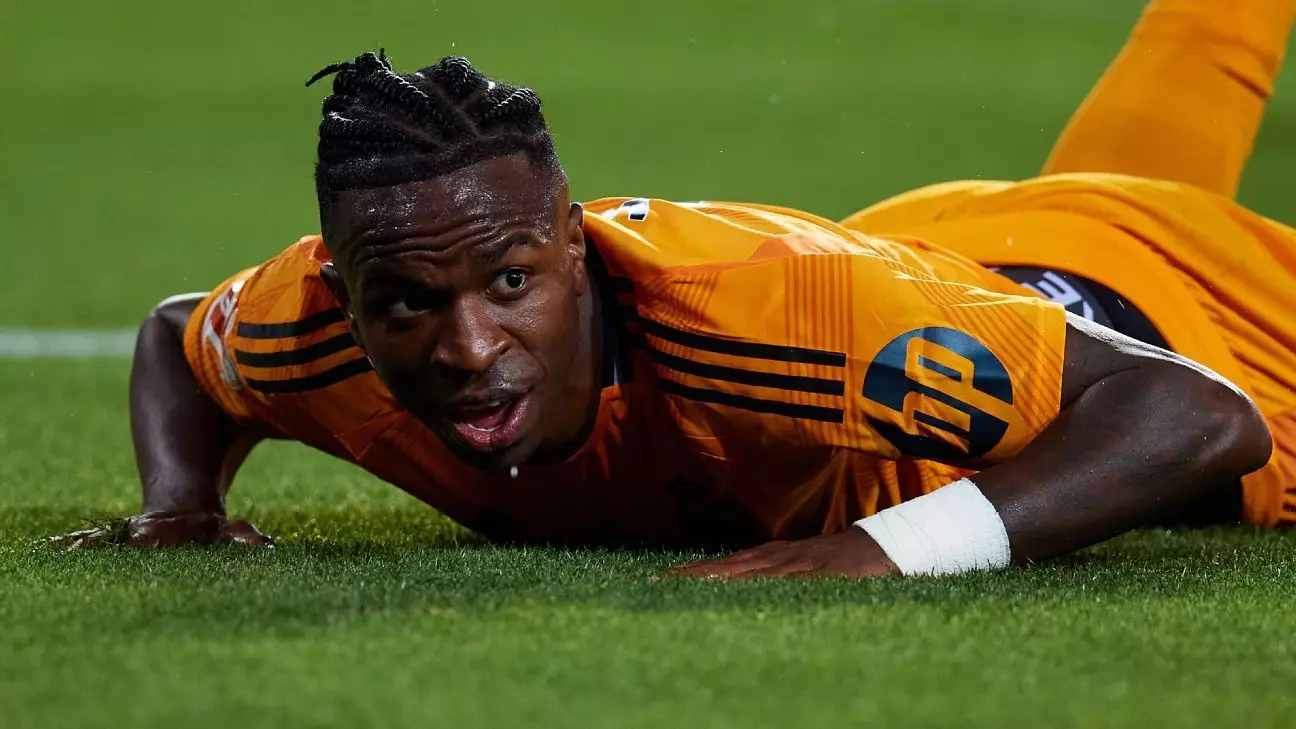In the world of football, few players elicit as much discussion—and controversy—as Vinicius Jr. The Brazilian winger for Real Madrid has recently found himself in the midst of scrutiny following a red card incident against Valencia. This event has not only sparked debates about his conduct but also raised questions regarding societal perceptions of race and player expectations in high-stakes environments. This article aims to analyze these aspects critically, navigating through the complexities of Vinicius’s situation while providing a fresh perspective.
Red Card Debacles and Their Implications
Vinicius’s early career in Madrid has been marked by remarkable achievements: nearly 300 appearances, 180 goal contributions, and a towering list of trophies. Yet, despite these figures showcasing his on-field brilliance, he has encountered discipline issues—resulting in two red cards, an uncharacteristically low number when compared against past Real Madrid players like Sergio Ramos. The contrast is striking; Ramos amassed ten red cards by the age of 24, yet his temperament was often brushed off as merely a reflection of his passion. On the other hand, when Vinicius reacts to provocation, it is interpreted through a more critical lens. This double standard prompts a deeper investigation into how players are judged based on their race and background.
Throughout football history, physicality has often been romanticized, particularly in the case of defensive players. Ramos’s numerous disciplinary infractions earned him a reputation not just as a fierce competitor, but also as a leader within the club. Vinicius, however, is painted as immature when he reacts defensively to provocations. Here lies a crucial disparity; Ramos’s white skin allowed him a buffer that Vinicius, a Black player, does not have. This raises uncomfortable questions about ingrained biases within not just the sport, but also society at large.
The media’s portrayal of Vinicius often amplifies the scrutiny surrounding him. Headlines hardly shy away from depicting him as overly sensitive or emotionally volatile. The expectations placed upon him as a superstar are compounded by the realities of his race; he is subjected to both the pressures of stardom and the barbs of societal prejudice. This duality creates a scenario where each misstep can lead to harsh criticisms that overshadow his extraordinary abilities.
Carlo Ancelotti, Real Madrid’s coach, acknowledged the intense scrutiny Vinicius faces. He emphasized that the club must work together to help the player mature in the face of constant provocation. Ancelotti’s sentiment indicates a critical understanding of Vinicius’s plight and the need for an empathetic narrative to surround his performance on the pitch. Footballers are human beings navigating complex emotional terrains while also being paraded in front of millions. However, this context is frequently ignored by pundits and commentators eager to point fingers.
The situation encapsulates broader societal expectations about how young players should behave under pressure. Vinicius Jr., still in the early years of his career, carries not only personal aspirations but also the weight of cultural representation. His vulnerability becomes evident when considering the significant burden of expectation placed upon him due to both his status as a highly regarded athlete and as a Black man in a predominantly white sport in Spain.
As he grows into his role, Vinicius’s performance even in the wake of his disciplinary struggles is remarkable. Since being controversially sent off, he has managed to make vital contributions to his team. His resilience is commendable, and his ability to rise above noise exemplifies a determination that should not go unnoticed. Yet, the media’s continual focus on his missteps eclipses his efforts to improve and mature—efforts acknowledged by those within his circle such as Ancelotti.
While many have called for a stricter disciplinary approach to Vinicius’s antics, it is equally important to foster a more constructive dialogue about player behavior and societal expectations. Advocating for measures that yield empathy over condemnation is crucial for not only Vinicius but for players dealing with similar challenges.
As fans and media navigate the line between criticism and support, it is vital to recognize the young talents who play the game. These individuals must steadily adapt while facing external pressures that sometimes feel insurmountable. Creating an environment where players are allowed to step back, learn, and mature without the fear of disproportionate backlash could be fundamental to their development.
Vinicius Jr.’s recent troubles underscore the need for introspection within the sport. Acknowledging biases and shifting the perspective from punitive judgment to nurturing development might not only benefit Vinicius but elevate the entire footballing community towards a more constructive and fair narrative. The world of football is enriched by the thrill, creativity, and passion that players like Vinicius contribute—let us celebrate that talent instead of critiquing it through a flawed lens.

